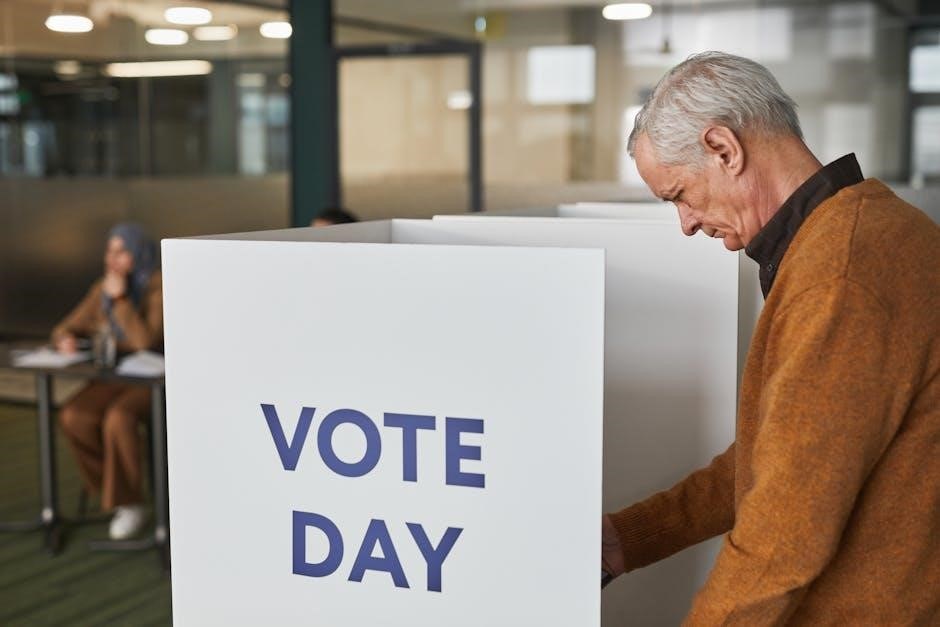we the people: the citizen and the constitution pdf
We the People: The Citizen and the Constitution is a civic education program developed in 1987, focusing on constitutional government and citizen responsibility. It engages students through interactive strategies like simulated congressional hearings, fostering civic competence and critical thinking skills. The program, designed for upper elementary and secondary students, emphasizes the U.S. Constitution’s historical foundations, evolution, and modern applications, preparing future citizens to uphold democratic principles.
Overview of the Program
We the People: The Citizen and the Constitution is a civic education program designed to promote understanding of constitutional government. Developed in 1987, it focuses on the U.S. Constitution’s history, principles, and modern applications. The program includes print textbooks, enhanced ebooks, and interactive strategies like simulated congressional hearings. It targets upper elementary and secondary students, fostering civic competence and responsibility. The curriculum covers foundational concepts, constitutional rights, and citizen roles, preparing students to engage actively in democracy.
Significance of Civic Education in Constitutional Government
Civic education is essential for fostering informed and active citizens in a constitutional democracy. It equips students with the knowledge and skills to understand their rights and responsibilities, enabling them to participate effectively in governance. By teaching the principles of constitutional government, civic education ensures the preservation of democratic values and the rule of law. It empowers future citizens to critically engage with societal issues, promoting a more informed and just society.
Historical Background and Development
We the People: The Citizen and the Constitution was developed in 1987 by the Center for Civic Education, part of the U.S. Constitution’s bicentennial celebration.
The Founding Fathers’ Basic Ideas About Government
The Founding Fathers envisioned a constitutional government based on liberty, democracy, and rule of law. They emphasized separation of powers, checks and balances, and federalism to prevent tyranny. Drawing from Enlightenment thinkers, they believed government derives authority from the people, ensuring individual rights and collective security. These principles, outlined in the Constitution, aimed to create a stable, just system, balancing power while protecting citizens’ freedoms and fostering civic responsibility.
Creation and Evolution of the U.S. Constitution
The U.S. Constitution was created during the Constitutional Convention in 1787, with key figures like James Madison playing a central role. The document was signed on September 17, 1787, and ratified by the states by 1788. Over time, it has evolved through amendments, beginning with the Bill of Rights in 1791. These changes reflect societal progress and legal interpretations, ensuring the Constitution remains a living document that adapts to the needs of modern society while preserving its foundational principles.

Structure and Content of the Program
We the People is structured into six units with 40 lessons, covering constitutional foundations, government organization, and citizen rights. Interactive strategies like simulated hearings enhance learning.
Units and Lessons: From Foundations to Modern Applications
We the People is divided into six units, each focusing on key aspects of constitutional government. Unit 1 explores foundational principles, while Units 2-4 delve into the Constitution’s creation, the structure of federalism, and the Bill of Rights. Units 5-6 address modern applications, including constitutional rights expansion and citizens’ roles in democracy. The program includes 40 lessons, blending discussions, debates, and simulations to engage students in active learning, ensuring a comprehensive understanding of civic responsibilities and constitutional governance.
Key Features: Interactive Strategies and Simulated Hearings
The program incorporates interactive strategies, including simulated congressional hearings, where students testify as expert witnesses on constitutional topics. These activities foster critical thinking, collaboration, and public speaking skills. The culminating event involves students presenting arguments before a panel, mirroring real-world civic processes. Such engaging methods make learning dynamic and relevant, ensuring students grasp constitutional principles and their modern applications effectively.

Educational Methods and Strategies
The program employs interactive classroom activities, structured lessons, and collaborative learning to enhance civic education, ensuring students engage deeply with constitutional principles and democratic values daily.
Engaging Students Through Performance Assessments
The program uses performance assessments, such as simulated congressional hearings, to evaluate students’ understanding of constitutional principles. These assessments require students to articulate their knowledge through structured presentations and discussions, fostering critical thinking and public speaking skills. By applying constitutional principles to real-world scenarios, students demonstrate their grasp of civic responsibilities and the democratic process, ensuring a deeper understanding of governance and citizenship.
Role of Teachers in Implementing the Program
Teachers play a pivotal role in implementing We the People by guiding students through interactive lessons and assessments. They utilize the program’s textbooks, ebooks, and instructional strategies to foster engagement and understanding. Teachers prepare students for simulated congressional hearings, ensuring they can articulate constitutional principles effectively. The teacher’s edition provides performance assessment materials and resources, enabling educators to support students in developing civic competence and critical thinking skills, essential for active citizenship.

Citizenship and Constitutional Rights
We the People emphasizes the cornerstone of citizenship and constitutional rights, exploring the rights and responsibilities of citizens through the Constitution and Bill of Rights. It fosters civic responsibility and prepares students to engage in democracy, ensuring they understand their role in maintaining constitutional democracy.
Understanding the Rights and Responsibilities of Citizens
We the People focuses on the balance between citizens’ rights and responsibilities, rooted in the Constitution. It explores foundational principles like individual liberties, the rule of law, and civic duties. Students learn how constitutional rights, such as free speech and equality, are protected and how citizens must actively participate in democracy, respect the law, and contribute to the common good. This understanding prepares students to engage meaningfully in civic life and uphold democratic values.
Expansion of Constitutional Rights Over Time
The U.S. Constitution has evolved to expand rights and ensure equality for all citizens. Amendments like the 13th, 14th, and 19th abolished slavery, established citizenship, and granted voting rights to women. Landmark Supreme Court decisions, such as Brown v. Board of Education and Obergefell v. Hodges, further extended rights, promoting justice and inclusivity. These developments reflect the Constitution’s ability to adapt, safeguarding freedoms and upholding the principle of equal protection under the law for future generations.
The Role of the Citizen in a Constitutional Democracy
Citizens play a vital role in upholding constitutional democracy by participating in civic life, exercising rights responsibly, and engaging in informed decision-making to ensure governance reflects the people’s will.
Participation in Civic Life: Voting, Protests, and Public Opinion
Active citizenship involves voting, peaceful protests, and shaping public opinion to influence governance. The program emphasizes these civic duties, teaching students to engage responsibly and advocate for their rights. Through simulated hearings and discussions, students learn how to voice opinions effectively and participate in democratic processes, fostering a deeper understanding of their role in shaping societal change and upholding constitutional principles.
Challenges to Civic Engagement in Modern Society
Modern society faces challenges like misinformation, voter apathy, and political polarization, which hinder civic engagement. Technological advancements, while empowering, also create divides and spread disinformation. The program addresses these issues by fostering critical thinking and media literacy, encouraging informed participation. It equips students to navigate complexities, promoting active citizenship and unity amid diversity, ensuring the Constitution’s principles remain vital in addressing contemporary challenges and fostering a resilient democracy.
Impact and Legacy of the Program
We the People has profoundly shaped civic education, fostering informed citizenship and active engagement. Its legacy lies in empowering future generations with constitutional knowledge and democratic values.
Assessing the Effectiveness of Civic Education
Evaluating civic education’s impact involves measuring students’ understanding of constitutional principles and their ability to engage in civic life. Performance assessments, such as simulated hearings, gauge critical thinking and problem-solving skills. Long-term studies show improved civic knowledge retention and increased voter participation among alumni. The program’s adaptability to modern educational needs ensures its relevance, making it a cornerstone of effective civic education in fostering informed and active citizenship.
Long-Term Influence on Students’ Civic Competence
The program fosters enduring civic competence by cultivating critical thinking and problem-solving skills. Students develop a deeper understanding of constitutional principles, enabling them to engage meaningfully in civic life. Over time, participants often demonstrate increased voter participation and community involvement, reflecting the program’s success in nurturing informed, active citizens. The long-term impact highlights the program’s role in shaping a lifelong commitment to democratic values and civic responsibility among its alumni.
Challenges and Future Directions
The program faces challenges in adapting to digital learning environments and addressing diverse student needs. Future directions include integrating technology and expanding civic engagement strategies to enhance accessibility and relevance for modern learners.
Addressing Misconceptions About the Constitution
The program helps clarify common misconceptions about the Constitution, such as its rigidity and lack of evolution. By exploring its historical context, amendments, and judicial interpretations, students gain a nuanced understanding of its dynamic nature. Interactive strategies and real-life applications further dispel myths, fostering civic literacy and critical thinking about constitutional principles and their relevance in modern society.
Adapting Civic Education for the Digital Age
The program incorporates digital tools, such as enhanced eBooks and online resources, to engage modern learners. Interactive strategies, including virtual simulated hearings, enhance accessibility and participation. By integrating technology, the curriculum addresses contemporary issues, fostering critical thinking and digital literacy. This approach ensures students remain informed and active citizens in an increasingly connected world, preparing them to navigate the complexities of democracy in the 21st century effectively;
Key Supreme Court Cases and Their Relevance
The program features landmark Supreme Court cases, such as Marbury v. Madison and Brown v. Board of Education, to illustrate constitutional principles and their impact on civil rights and government structure, empowering students to understand their roles in democracy.
Landmark Decisions Shaping Constitutional Interpretation
The program highlights landmark Supreme Court cases like Marbury v; Madison, Brown v. Board of Education, and Tinker v. Des Moines, which have profoundly shaped constitutional interpretation. These cases address judicial review, equality, and free expression, illustrating how the Constitution evolves to reflect societal values. By analyzing these decisions, students gain insight into the judiciary’s role in interpreting laws and upholding citizens’ rights, fostering a deeper understanding of constitutional democracy and its application in modern society.
Current Cases and Their Implications for Citizens
Recent Supreme Court cases, such as those addressing digital privacy and free speech, highlight evolving interpretations of constitutional rights. These decisions impact citizens’ daily lives, shaping how rights are applied in modern contexts. For instance, cases involving technology and privacy test the boundaries of the Fourth Amendment, influencing how citizens’ personal data is protected. Understanding these cases helps students grasp the dynamic nature of constitutional law and its relevance to contemporary issues, fostering informed civic engagement and awareness of rights in a changing world.

Comparative Perspectives on Constitutional Government
This program encourages students to explore global perspectives on constitutional governance, fostering an understanding of diverse governance models and their implications for democracy worldwide.
Other Countries’ Approaches to Civic Education
Other nations employ diverse methods to cultivate civic awareness, such as integrating constitutional values into school curricula or utilizing community-based programs. For instance, India emphasizes constitutional principles through public discourse, while European countries often focus on collective responsibility. These approaches highlight the global significance of civic education in fostering democratic values and active citizenship, offering valuable insights for comparative analysis.
Global Lessons for Strengthening Constitutional Democracies
Global perspectives offer valuable insights into enhancing civic education and strengthening constitutional democracies. International comparisons reveal diverse approaches to fostering civic engagement, such as integrating cultural values into curricula or leveraging technology for participatory learning. These lessons emphasize the importance of adaptability and inclusivity in civic education, ensuring that democratic principles resonate across diverse societies. By learning from global practices, nations can refine their strategies to cultivate informed and active citizens.
Civic education remains vital for fostering informed and engaged citizens, essential for a thriving constitutional democracy. Programs like We the People empower students to understand their rights and responsibilities, fostering critical thinking and active participation. By equipping future generations with civic competence, such initiatives ensure the endurance of democratic principles. The enduring importance of civic education lies in its ability to cultivate a society capable of upholding constitutional values and contributing to the common good.

